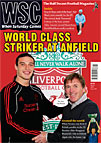 Simon Tyers looks at how football coverage on Sky Sports has changed since it was first introduced in 1991
Simon Tyers looks at how football coverage on Sky Sports has changed since it was first introduced in 1991
Without fully raking over the Gray-Keys saga, two further points. One is to note the irony in Sky considering Andy Gray’s last straw to be remarks of a sexual nature towards Charlotte Jackson, who promoted the new season on Sky Sports in August by doing a shoot for Loaded magazine. The other is to consider that they were keen to get rid of Gray because pundits are ultimately replaceable – think of Ron Atkinson and remember that Sky did it themselves five years ago with Jeff Stelling’s primary sparring partner Rodney Marsh – while main presenters aren’t.
Keys has been the presentational face of the network since it launched, 20 years of reassuring glances to camera and teasing out the subtle difference between “live and exclusive” and “exclusively live”. Until the latest unpleasantness, Sky had been so confident of their anchor stability they’d never bothered to bring up a proper understudy should he have a “moment”.
If nothing else, for the rest of 2011 all this will be an almighty elephant in the room as Sky Sports celebrate their 20th anniversary – although strictly speaking it started as a rebranding of the Sports Channel which launched in 1990. The china anniversary has been commemorated with The Sky Sports Years, a cherrypicking of action and presentation year by year set to a deadening pop soundtrack and no further explanation.
What we get instead is hurrah-for-us flag waving – the theme concluding with an emphatic “Here we go, here we go, this is it!” – sitting uncomfortably with the implicit suggestion that they really didn’t know what they were doing half the time. Obviously the early years were more fun, especially the first, 1991, when Sky didn’t believe the football world revolved around them and are forced in retrospect to let on that they didn’t actually have that much top class action from their central money spinner at all. As well as opening with an FA Cup final they didn’t show live, we’re asked to believe that one of the games everyone talked about that year was the north London derby Charity Shield, a game that finished 0-0 with not even a redeeming penalty shoot-out.
Among the faces passing by are several who would find more fulfilling roles with other broadcasters: Jonathan Pearce, John Inverdale, Sue Barker looking older than she does now, Mark Lawrenson participating in the sort of Liverpool failure discussion that he’s been party to about once a fortnight ever since, Andy Townsend laughing merrily along as pitchside guest Vinnie Jones runs through his act. At least in 1991 they were getting their money’s worth out of Keys, most of the clips seemingly taken from what must have been hours and hours of unbroken inconsequential chat with various mid-range sporting figures and presenters. Keys even wears the same salmon coloured tank top in all the clips chosen, one of which featured the unmissable combination of a bemused Tommy Docherty, that man Vinnie and David Platt in a suit.
The Sky Premier League product has become so slick in recent years that it’s easy to forget the hit-and-hope nature of their original pledge to give the viewers “something that they’ve never had before”, as Gray said at the press launch. Keys called this “a few smiles, some family fun” at the start of the first Monday Night Football before introducing “the Sky Strikers about which you’ve heard so much – some more formal introductions a little later in the programme”. Keys’s conviction that Sky do things the way they should be done has been displayed for all to see of late, but it was always present.
Using a turn of phrase that will ensure this look back at 1992 is never repeated, his first question to Chris Waddle was to ask if he was “impressed with what was in the centre circle?” Waddle said yes, but his body language suggested he wished he was elsewhere. Keys was not to be deterred, though. “That seemed to go down very well,” he giggled at their routine’s conclusion, to a backdrop of almost no audible cheering and a solid chorus of “Who are ya?” They lasted the whole first Premier League season, though, despite such hitches as their music failing at Elland Road, leading to some grammatical fireworks from a hastily covering Keys: “That’s always going to happen, isn’t it? Live and kicking, black and white, you pay your money, you take your choice.” Back then many felt their game was being demeaned by Sky associating it with cheerleaders. By the middle of the decade, however, most British clubs had their own dance troupe. Does that say more about us or them?
From WSC 289 March 2011